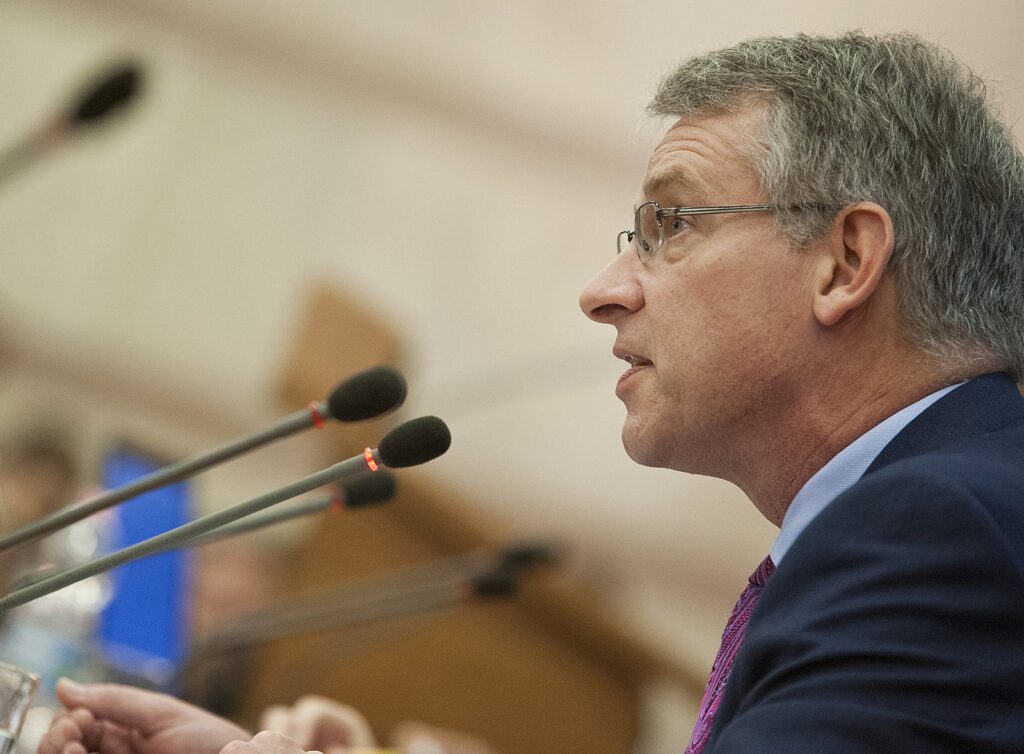
On Thursday, May 26th, Vox Veritatis with the assistance of The Thomistic Institute hosted Notre Dame Professor Brad Gregory to give a lecture on the Dartmouth campus. Titled “The Middle Ages: Dark Ages of Superstitious Backwardness, Golden Age of Catholic Harmony, or Neither?”, the lecture delved into differing modern views of the Medieval Era. Gregory himself is the Dorothy G. Griffin Collegiate Chair in European History at Notre Dame University and his area of focus is early modern European history and Christianity during the Reformation. His two previous books are The Unintended Reformation: How a Religious Revolution Secularized Society and Rebel In The Ranks: Martin Luther, the Reformation, and the Conflicts That Continue to Shape Our World. Formerly, he served as the director of the Notre Dame Institute for Advanced Studies from 2013 to 2019.
The event started with the President of Vox Veritatis Tony Perez ’22 giving introductory remarks to the lecture. Notably, Perez took previous Review criticism to heart, specifically opting not to start the event with an awkward and uncomfortable joke (like how he started his last event). We applaud Perez for both reading and considering The Review’s advice. He is perhaps one of a few students on campus to do this.
Though both the lecture title and Gregory’s book titles are a mouthful for anyone, Gregory’s lecture was easy to both approach and understand for those not familiar with Medieval History. As the title suggests, Gregory addressed two different outlooks of the Medieval Era and showed the flaws of them both. First, he tackled the popular, modern secular view that the Medieval Era was a backward era, held down by an oppressive Church, lack of intellectual culture, and sparse material means. Gregory situated this view in the context of a progressive theory of history, or Whig History, where history is a series of improvements of humanity over time up to the culmination of the Modern Era, which this view holds as the ultimate era of humanity. Gregory was quick to note that unlike popular representations the Medieval Era was a dynamic age of both material and intellectual growth. Fitting for an event hosted by The Thomistic Institute, Gregory referenced the works of St. Thomas Aquinas as an obvious example of how this age was not an intellectual dark age but one of serious intellectual activity. He noted that the Catholic Church did not stamp out this intellectual activity but actively encouraged it, noting how the Church and multiple Popes were some of the largest backers of the Renaissance.
The second view of the Medieval Era that Gregory addressed was an overly romantic view that the Medieval Era was a Golden Age where the Church fostered and protected the people of Europe, allowing for a harmonious Christian society. While not having the mass popularity that the previous view had, this Golden Age view has found favor amongst modern Catholics and Romantics, who look back on the Middle Ages as a time before the deleterious effects of modernization. Gregory responded to this outlook by noting how the Medieval Era was marked by division, especially within the Catholic Church. The history of Christianity has been one of the continual calls for reforms, and the Medieval Era was not an exception to this trend. Most famously, St. Francis of Assisi endeavored to rebuild the Church brick by brick, a calling that is not in line with an outlook of an age of Christian harmony.In all, the event was well attended and well received for a lecture of this kind, making Vox Veritatis two for two with successful events to start their time on campus. One anonymous Heorot gave enthusiastic support for the event, commenting “That was great!”. Talking with Professor Gregory after the event and attending a smaller seminar the next day proved to shed light on how rare an intellectual Gregory is, being both knowledgeable and personable, and not radical but strong in his faith. Vox Veritatis has more campus events planned for the fall, and The Review highly encourages all on campus to attend.

Be the first to comment on "The Middle Ages Revisited: Brad Gregory Comes to Dartmouth"